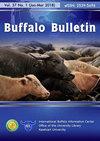Effect of different rearing systems on behavioural responses to novel stimuli in Murrah buffalo calves
IF 0.2
4区 农林科学
Q4 AGRICULTURE, DAIRY & ANIMAL SCIENCE
引用次数: 0
Abstract
The study reported aimed to assess the effect of different rearing systems on behavioural responses to novel stimuli in Murrah buffalo calves. Calves in the experiment were grouped in three treatments in accordance with differed maternal interaction: dam-reared through fenceline (FMC; n = 8), restricted maternal contact (RMC; n = 8); no maternal contact (NMC; n = 8). FMC calves had permanent access to their mothers for first 5 days of birth and thereafter were housed in groups with fence line separation from their mothers and suckled twice a day. RMC calves had access to their mother only twice a day during the suckling hours. NMC calves were separated from their mothers within 24 h after birth and fed via bottle with nipple. Behavioral response of each calf toward novel object (a bright coloured ball) was evaluated on exposure during the test for three consecutive days across three months. The findings showed that buffalo calves that were given fence line contact with their mothers performed significantly (P<0.05) the best across all treatment groups in terms of response to a novel stimuli. Whereas the performance of calves with restricted contact with their mothers was superior to calves weaned at birth from their mothers, it was not on par with calves with full time fence line contact with their mothers, calves weaned at birth with no provision of maternal contact performed poorly in terms of behavioural response to novel stimuli.不同饲养方式对默拉水牛对新刺激行为反应的影响
该研究报告旨在评估不同饲养系统对默拉水牛小牛对新刺激的行为反应的影响。根据母畜相互作用的不同,将试验用犊牛分为3组:围栏圈养;n = 8),限制性母体接触(RMC;N = 8);无母体接触(NMC;n = 8)。FMC犊牛在出生的前5天可以永久地接触到它们的母亲,之后将它们分成一组,与母亲隔开围栏,每天哺乳两次。在哺乳时间,RMC的小牛每天只能和母亲接触两次。NMC犊牛出生后24 h内与母牛分离,用带乳头的奶瓶喂养。在三个月内连续三天的测试中,对每只小牛对新物体(一个鲜艳的球)的行为反应进行评估。结果表明,在所有处理组中,与母亲在栅栏线上接触的水牛小牛在对新刺激的反应方面表现最好(P<0.05)。虽然与母亲接触有限的小牛的表现优于出生时断奶的小牛,但与与母亲在围栏线上完全接触的小牛相比,在出生时断奶的小牛在对新刺激的行为反应方面表现不佳。
本文章由计算机程序翻译,如有差异,请以英文原文为准。
求助全文
约1分钟内获得全文
求助全文
来源期刊

Buffalo Bulletin
AGRICULTURE, DAIRY & ANIMAL SCIENCE-
CiteScore
0.50
自引率
0.00%
发文量
53
审稿时长
>12 weeks
期刊介绍:
Buffalo Bulletin is published quarterly in January-March, April-June, July-September and October-December. Contributions on any aspect of research or development, progress reports of projects and news on buffalo will be considered for publication in the bulletin.
 求助内容:
求助内容: 应助结果提醒方式:
应助结果提醒方式:


